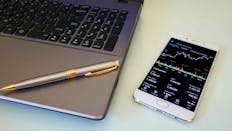Top 5 Best Brokers for cTrader in January 2026
All products and services featured are independently selected by WikiJob. When you register or purchase through links on this page, we may earn a commission.
- A list of the Top cTrader Brokers for January 2026:
- Comparison Chart of the Best cTrader Brokers for January 2026
- Description of the Best cTrader Brokers for January 2026
- What Is a cTrader Broker?
- The Pros and Cons of cTrader
empty
empty
- A Guide to Automated Trading with cTrader and Custom Indicators
empty
empty
empty
empty
empty
empty
- How to Set Up Charts on cTrader
- Using cTrader for Scalping: Speed and Intuition in Order Management
- How to Choose a cTrader Broker
empty
empty
empty
empty
empty
- cTrader vs MetaTrader: Which Should I Use?
empty
empty
empty
empty
empty
- Frequently Asked Questions
- Final Thoughts
A list of the Top cTrader Brokers for January 2026:
Comparison Chart of the Best cTrader Brokers for January 2026
Regulation FCA, DFSA, CySEC, BaFIN, ASIC, CMA, SCB | Minimum Deposit $0 | Spreads Variable, Low | |||
Regulation FCA, ASIC, CFTC | Minimum Deposit £250 | Spreads Variable, Competitive | |||
Broker IC Markets | Regulation ASIC, CySEC | Minimum Deposit $200 | Spreads Raw Spread, Low | ||
Regulation IFSC | Minimum Deposit $10 | Spreads Variable, Competitive | |||
Broker Forextime | Regulation FCA, CySEC, FSCA | Minimum Deposit $10 | Spreads Variable, Competitive |
1. Pepperstone
Pepperstone is a well-established broker that was founded in 2010 in Melbourne.
With regulation by seven regulations, including ASIC and the FCA, it is considered a safe broker that works with cTrader, offering 62 forex pairs, as well as a number of CFD options.
Pepperstone has two different account types that work with cTrader – the Razor account charges commission, while the Standard account has fees built into the spread.
There are no account fees or charges for most deposits and withdrawals. The minimum deposit to open an account is $0, which is about the industry standard, and the account opening process is fast, easy and completely online.
For beginner traders, Pepperstone has a wealth of educational resources and offers both third-party and in-house research.
This is a well-regarded and safe broker with a great reputation that is a solid choice for traders who are looking to take advantage of the extended functionality of the cTrader platform.
2. IG
IG founded in 1974, is one of the UK’s biggest online brokerage platforms, celebrated for its seamless integration and optimisation for cTrader enthusiasts.
Renowned as a premier destination for traders seeking excellence, IG's dedication to the cTrader ecosystem shines through its user-friendly interface, lightning-fast execution, and a comprehensive suite of tools tailored to empower traders at every level.
In addition, the IG broker platform is used by over 239,000 brokers worldwide and enables instant access to over 17,000 markets.
With IG, mastering the markets becomes a harmonious blend of precision, innovation, and unrivalled support, making it a beacon for those who demand nothing short of the best in their trading endeavours.
To find out more, read our IG review.
3. IC Markets
IC Markets is a forex and CFD broker that has been in business since 2007. They are a popular choice for traders due to their competitive spreads, low minimum deposit requirements, and fast order execution.
Their cTrader platform offers a number of features that make it a popular choice for traders, including:
- Fast execution speeds
- Advanced charting and analysis tools
- A wide range of order types and execution modes
- Support for algorithmic trading
If you are looking for a broker that offers cTrader, IC Markets is a good option to consider. They are a reputable and reliable broker with a good track record.
Here are some of the benefits of using IC Markets to trade cTrader:
- Competitive spreads
- Low minimum deposit requirements
- Fast order execution speeds
- A wide range of trading instruments
- A user-friendly trading platform
- Excellent customer support
4. Roboforex
Headquartered in Cyprus, RoboForex was established in 2009 and is regulated by CySEC and IFSC. With this broker, you can have access to almost 9,500 trading instruments with a minimum deposit of just $10.
RoboForex has full usability across the web, desktop and mobile platforms, and with good education and research available, it is an excellent choice for beginners.
With strategy-building tools and access to algorithmic trading on cTrader, users of the RoboForex brokerage can choose their own ways of making trades across a large number of instruments.
There are no fees for deposits and withdrawals, although there is a small inactivity fee, and there are no commission charges, so the trading fees are built into the spread.
One of the unique selling points of RoboForex is that, depending on your location, traders can get access to a huge range of leverage levels.
The low minimum deposit, bonuses for new customers and 24/7 access to email and phone support are some of the main reasons that new traders feel comfortable with RoboForex.
5. FXTM
FXTM was founded in 2011 and is regulated by FCA and CySEC. With fast and fully digital account opening, a Micro account can be opened with only a $50 minimum deposit.
Traders can choose to open a Standard account to use the cTrader platform, with slightly higher spreads and zero commission, or the ECN account, which charges a small commission but gives access to much tighter spreads.
The user interface is simple and straightforward, with good customisation options and the ability to use several different order types, on the web platform, a desktop application or through the mobile app that is available on iOS and Android.
Some more advanced traders might find it a bit clunky and outdated.
In terms of education, there is a demo account as well as videos and articles, and new traders will find the glossary particularly useful.
Despite the limited portfolio of just 62 currency pairs and some 200 CFDs, this is a popular broker for its simplicity and the opportunity to work in small lots with the Micro account.

What Is a cTrader Broker?
A forex broker is a financial services provider that works as a third party or middleman allowing you as a trader to use trading platforms to buy and sell commodities and currency.
Using a broker, you can trade forex, cryptocurrency, CFDs, ETFs and commodities for investment purposes or to make money.
Forex brokers often provide extra services like education and research, allowing both experienced traders and those who are new to the platform to make the most of their trades.
This includes different strategies, the use of expert advisors and even things like social or copy trading.
cTrader is a trading platform that is considered to be intuitive and easy to use, with advanced trading capabilities.
It was designed to replicate a ‘proper’ institutional trading environment, with features like extended order functionality, depth of market, customisation options and the opportunity for coding in C# and through open API.
The Pros and Cons of cTrader
Pros
- Fast trade execution
- Customizable charts
- Intuitive order management
- One-click trading
- Advanced order types
Cons
- Limited broker support
- Steep learning curve
- Limited automation
- No mobile app
Pros
- Fast trade execution – cTrader is known for its fast trade execution, which can be crucial for traders who need to enter and exit trades quickly.
- Customizable charts – cTrader offers customizable charts, allowing traders to set up their charts with preferred indicators and time frames.
- Intuitive order management – cTrader's order management system is designed to be intuitive and user-friendly, making it easier for traders to manage their orders.
- One-click trading – cTrader's one-click trading feature allows traders to execute trades quickly with just one click.
- Advanced order types – cTrader supports a range of advanced order types, including stop-loss and take-profit orders, which can help traders manage their risk effectively.
Cons
- Limited broker support – cTrader is not as widely supported by brokers as some other trading platforms, which can limit the choice of brokers available to traders.
- Steep learning curve – While cTrader's order management system is intuitive, the platform itself can be complex and difficult to navigate for beginners.
- Limited automation – While cTrader does offer some automation options, it is not as fully automated as some other trading platforms.
- No mobile app – cTrader does not offer a mobile app for iOS or Android devices, which can be a disadvantage for traders who prefer to trade on-the-go.
Overall, cTrader can be a powerful tool for traders who require fast trade execution and advanced order types.
However, the platform may not be ideal for beginners, and its limited broker support and lack of mobile app may be disadvantages for some traders.
A Guide to Automated Trading with cTrader and Custom Indicators
Automated trading with cTrader and custom indicators can help traders to execute trades quickly and accurately.
Here is a guide to getting started with automated trading on cTrader:
Choose a Broker
The first step to automated trading with cTrader is to choose a broker that offers the platform and supports automated trading.
Look for a broker that offers competitive spreads, low commissions and a reliable trading environment.
Learn the Basics of Coding
To create custom indicators and automated trading strategies, you will need to learn the basics of coding.
C# is the primary programming language used in cTrader, so it's a good place to start. You can learn to code using online resources, tutorials or by taking a programming course.
Create Your Custom Indicator
Once you have a basic understanding of coding, you can create your custom indicator or download one from the cTrader marketplace.
Custom indicators can help you to identify trading opportunities, execute trades based on specific criteria and track market trends.
Backtest Your Strategy
Before using your custom indicator for live trading, it's important to backtest it on historical data to see how it performs.
You can use cTrader's backtesting feature to test your strategy and optimize your trading rules.
Configure Your Trading Robot
After you've created your custom indicator and backtested your strategy, you can set up your automated trading robot.
This involves selecting the appropriate parameters, such as trade size, stop-loss and take-profit levels, and defining the trading rules that the robot will follow.
Monitor Your Trades
Even with automated trading, it's important to monitor your trades to ensure that they are executing correctly and adjust your strategy as needed.
Keep an eye on your trading robot's performance, and make changes to your trading rules or parameters as necessary.
It's important to note that automated trading can be risky, and you should always practice good risk management techniques to avoid unnecessary losses. This includes:
- Setting appropriate stop-loss levels
- Monitoring your trades
- Diversifying your portfolio
It's also a good idea to test your strategy thoroughly before using it for live trading and seek the advice of a professional if you are unsure about any aspect of automated trading.
How to Set Up Charts on cTrader
Setting up charts on cTrader is a straightforward process, and allows traders to view price movements and analyze technical indicators.
Here is a step by step guide to setting up charts on cTrader:
Step 1. Open cTrader and Select an Instrument
Open the cTrader trading platform on your desktop or mobile device.
Choose an instrument that you want to view on a chart. This can be a currency pair, stock or commodity.
Step 2. Open a Chart
To open a chart for the selected instrument, right-click on the instrument in the market watch window and select 'New Chart' from the drop-down menu.
Alternatively, you can click on the instrument in the market watch window and drag it onto the chart window.
Step 3. Customize Your Chart
Once you have opened a chart, you can customize it to suit your preferences.
You can adjust the time frame by clicking on the drop-down menu at the top of the chart window and selecting a different time frame.
You can also change the chart type, add technical indicators and draw trend lines and other chart patterns.
Step 4. Add Technical Indicators
To add a technical indicator to your chart, click on the 'Indicators' button at the top of the chart window.
This will open a drop-down menu where you can select from a range of indicators.
Click on the indicator you want to add, and it will be applied to your chart.
Step 5. Save Your Chart Layout
If you want to save your customized chart layout, click on the 'Save' button at the top of the chart window and give your layout a name.
Step 6. Analyze Your Chart:
Use your customized chart to analyze price movements, identify trends and make trading decisions.
Keep in mind that chart analysis is only one aspect of trading, and it's important to consider other factors such as news events and market sentiment.
By following these steps, you can set up a customized chart on cTrader and use it to make informed trading decisions.
Using cTrader for Scalping: Speed and Intuition in Order Management
Scalping is a popular trading strategy among traders who seek to profit from small price movements.
The cTrader platform can be an effective tool for scalping due to its fast trade execution and intuitive order management.
Here's how you can use cTrader for scalping:
-
Choose a broker that supports scalping and offers fast execution and low spreads. This is crucial for scalping, as you need to be able to enter and exit trades quickly.
-
Set up your charts with your preferred indicators and time frames to help you identify potential trades quickly.
-
Use cTrader's one-click trading feature to execute trades quickly with just one click. This can be particularly useful for scalping, as it allows you to enter and exit trades swiftly.
-
Set up order templates for your preferred trade sizes and stop-loss levels to make order management more efficient and intuitive. This can save time and prevent costly mistakes.
-
Monitor your trades closely and be ready to exit quickly if the market moves against you. Even with fast trade execution, it's important to keep a close eye on your positions to avoid significant losses.
-
Practice good risk management by using stop-loss orders to limit your losses and avoiding risking more than you can afford to lose.
How to Choose a cTrader Broker
Trustworthiness
When you make a deposit with a broker, you want to be sure that your money is safe while you are making trades.
The trustworthiness of a broker can be assessed in a couple of different ways, such as:
Reputation
This is a measure of how clients and customers view the broker, and you can get a feel for this by looking at consumer review sites.
Reputation also comes from how long the broker has been in business – a good broker can stand the test of time without risking the investments of their customers.
Regulation
As international financial services providers, brokers that are regulated have to follow certain rules when it comes to their clients and the management of money.
The more regulation that a broker has, the safer your money should be while you are using their services.
Not all regulators are considered equal, however, and it is important that the broker that you want to use is regulated by an authority based in the country that you reside in.
For example, in Australia, regulation is from ASIC, and in the UK, it is FCA that you need to look for. Top tier regulators also include CySEC and NFA.
Fees
The fees for using the broker are how the business makes money, and there are different types of fees to consider when looking at the right broker for you.
Some brokers will charge account fees. These are related to running and managing your account, and they can include a monthly fee, fees for making a deposit or a withdrawal and inactivity fees if you do not make any trades for a certain amount of time.
Trading fees are part of the cost of trading, and they usually come in the form of a flat rate commission – a set amount per trade over and above the buy price, or the fees are built into the spread, so you pay more per trade.
What Is the User Experience Like?
The user experience is something that is important for new and experienced traders.
Brokers provide an interface for you to use your chosen trading platform, and that interface needs to be simple to use and provide all the functionality that you want.
You will probably want the opportunity to use your broker and all the trading options in different ways, whether that is through a desktop application, a web trader or on a mobile device, so you can make and monitor your trades on the go.
Customer Service
Even experienced traders might need to contact customer services for a problem or an issue – so the availability of answers when you need them might be a consideration for you when you are choosing a broker.
Most brokers offer a range of ways of getting through to customer services, usually via live chat, over the phone or through email.
Availability of help will vary, with some brokers offering a 24/7 service, while others will only be available on weekdays, for example.
Do They Allow Your Preferred Type of Trading?
There are a number of strategies you could use for your trading, and as a new trader, it might all seem a bit daunting. But one of the things you should consider before settling on a broker is whether they offer options for different types of trading.
Some experienced traders are interested in high leverage, scalping, hedging or using expert advisors.
There are multitudes of different order types that you might want to take advantage of, too, so look for the types that might be available.
cTrader vs MetaTrader: Which Should I Use?
cTrader and MetaTrader are two of the most popular trading platforms available.
Here are some factors to consider when deciding which platform to use:
User Interface and Ease of Use
cTrader has a modern and intuitive interface, with features like one-click trading and drag-and-drop charting making it easy for traders to use.
MetaTrader's interface can be more complex, with a steeper learning curve for beginners.
For example, cTrader's clean interface provides easy access to order management tools, while MetaTrader requires multiple steps to manage orders.
Trading Features and Tools
cTrader offers a range of advanced charting tools, including time frames from one second to one month and 70+ technical indicators.
It also offers advanced order types such as Market Range, Stop Limit and Stop Loss/Take Profit.
MetaTrader has a wider selection of custom indicators and expert advisors, making it popular among algorithmic traders.
It also offers advanced order types like Buy Stop Limit, Sell Stop Limit, and Buy Limit Stop.
Speed and Reliability
cTrader's technology is designed to provide fast trade execution, with a latency of under 1 millisecond. Its order execution speeds are around 10 times faster than those of MetaTrader.
cTrader's server infrastructure is also designed to provide high reliability and uptime.
MetaTrader also offers fast trade execution and high reliability, but cTrader is generally considered faster and more efficient.
Broker Support
MetaTrader is supported by a wide range of brokers, including many of the largest brokers in the world.
cTrader is less widely supported, but it is still offered by many reputable brokers.
For example, IC Markets offers both cTrader and MetaTrader.
Mobile Trading
Both platforms offer mobile trading, but cTrader's mobile app is generally considered to be more user-friendly and efficient.
It offers features like advanced charting, price alerts and account management tools.
MetaTrader's mobile app also offers charting and order management tools, but it can be more difficult to navigate for some traders.
Ultimately, the choice between cTrader and MetaTrader will depend on your personal preferences and trading needs:
- If you value advanced charting tools and order types, cTrader may be the better choice.
- If you prefer a wider selection of custom indicators and expert advisors, MetaTrader may be the better choice.
It's a good idea to test both platforms and see which one feels more comfortable and efficient for your trading style.
Frequently Asked Questions
cTrader is a popular trading platform developed by Spotware. It is offered by a number of different brokers, including:
- FxPro
- IC Markets
- OctaFX
- FIBO Group
- RoboForex
- Fondex
If you are interested in trading with cTrader, you should research different brokers to find one that suits your needs and preferences. You should also consider factors such as regulation, fees, customer support and the range of financial instruments offered by each broker before making a decision.
cTrader is the platform that was created by Spotware to offer beginner and experienced traders an environment that replicates the professional or institutional trade floor, and with advanced order types, algorithmic trading and an intuitive interface, it is easy to use even with no experience.
For the beginner trader, there are educational support videos included, and more advanced traders can see more details about their trades thanks to the trade analysis feature.
cTrader is a beginner-friendly trading platform with a clean and intuitive interface, advanced charting tools and a demo account to practice trading.
Some brokers offering cTrader also provide educational resources and social trading features for beginners to follow and copy the trades of more experienced traders.
However, it's important for beginners to have a basic understanding of trading concepts, a solid trading strategy and practice good risk management techniques to avoid unnecessary losses.
cTrader offers a comprehensive range of trading instruments, including:
- Currency pairs (forex)
- Indices
- Stocks
- Shares
- Commodities
- Cryptocurrencies
- CFDs
- EFTs
Traders can also make use of algorithmic trading, copy trading and several different order types when trading on all of the above.
MetaTrader 5 is the newer iteration of the MetaQuotes software MetaTrader 4, but despite the updated language and technology on the platform, MT5 hasn’t reached the same level of popularity.
Released at around the same time as MT5, cTrader offers a similar level of functionality, but there are some differences that might make it a preferred platform for the trader.
One of the major differences is that it uses the C# programming language, rather than MQL5, which is used on MetaTrader. It is also more modern-looking in design.
In terms of which is better, it mostly comes down to personal preference – MT4 users might feel more comfortable upgrading to the improved functionality of MT5 because the layout and structure of the platform have remained the same, while other users might like the slightly more updated look and feel of the cTrader interface.
Final Thoughts
Choosing the right broker to invest with could be one of the most important choices you make for your portfolio, and it is extremely important that you feel comfortable and confident in your choice.
Trading of any kind comes with an inherent financial risk: no trade is guaranteed to make a profit. Therefore, having the financial backing of a well-regulated and professional brokerage system should help.
Of course, the right broker will also allow you to make your trades in the way that you want to, whether you want the option for huge leverage or you prefer scalping.
A broker that allows you access to more than one platform is a good way to ensure that you can buy and sell the instruments that you want to in the way you think will maximise your profits and make the most of your portfolio.







